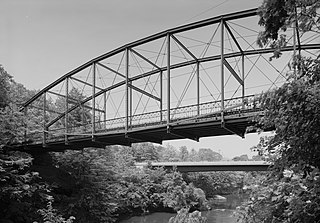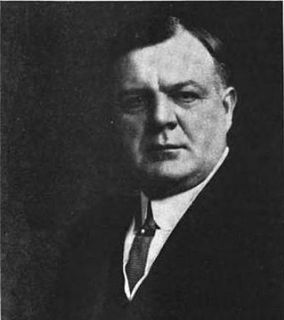Related Research Articles

A fruit press is a device used to separate fruit solids - stems, skins, seeds, pulp, leaves, and detritus - from fruit juice.

Jethro Tull was an English agriculturist from Berkshire who helped to bring about the British Agricultural Revolution of the 18th century. He perfected a horse-drawn seed drill in 1700 that economically sowed the seeds in neat rows, and later developed a horse-drawn hoe. Tull's methods were adopted by many landowners and helped to provide the basis for modern agriculture.

A reaper is a farm implement or person that reaps crops at harvest when they are ripe. Usually the crop involved is a cereal grass. The first documented reaping machines were Gallic reaper that was used in modern-day France during Roman times. The Gallic reaper involved a comb which collected the heads, with an operator knocking the grain into a box for later threshing.

The M1903 Springfield, officially the United States Rifle, Caliber .30-06, Model 1903, is an American five-round magazine fed, bolt action service repeating rifle, used primarily during the first half of the 20th century.

A hoe is an ancient and versatile agricultural and horticultural hand tool used to shape soil, remove weeds, clear soil, and harvest root crops. Shaping the soil includes piling soil around the base of plants (hilling), digging narrow furrows (drills) and shallow trenches for planting seeds or bulbs. Weeding with a hoe includes agitating the surface of the soil or cutting foliage from roots, and clearing soil of old roots and crop residues. Hoes for digging and moving soil are used to harvest root crops such as potatoes.

Carnegie Steel Company was a steel-producing company primarily created by Andrew Carnegie and several close associates to manage businesses at steel mills in the Pittsburgh, Pennsylvania area in the late 19th century. The company was formed in 1892 and was subsequently sold in 1901 in one of the largest business transactions of the early 20th century, to become the major component of the United States Steel Corporation. The subsequent sale made Carnegie one of the richest men in history.

Elkins is an unincorporated community in New London, Merrimack County, New Hampshire, United States. It is situated at the east end of Pleasant Lake. It is home to a public beach, gas station, ice cream shop, auto repair garage, post office, church, veterinarian office, and alpaca farm. Also central to the community is the Hall of The American Legions and adjacent bandstand.
Burton J. Westcott (1868–1926) was one of Springfield, Ohio’s most prominent citizens and successful businessmen.

A tedder is a machine used in haymaking. It is used after cutting and before windrowing, and uses moving forks to aerate or "wuffle" the hay and thus speed up the process of hay-making. The use of a tedder allows the hay to dry ("cure") better, which results in improved aroma and color.

A powder mill was a mill where gunpowder is made from sulfur, saltpeter and charcoal. Crude grinding and mixing operations like the Frankford Powder-Mill of Philadelphia were a cottage industry until the industrial revolution brought improved product quality through the following procedures:

The Oliver Farm Equipment Company was an American farm equipment manufacturer from the 20th century. It was formed as a result of a 1929 merger of four companies.: the American Seeding Machine Company of Richmond, Indiana; Oliver Chilled Plow Works of South Bend, Indiana; Hart-Parr Tractor Company of Charles City, Iowa; and Nichols and Shepard Company of Battle Creek, Michigan
The Standard Steel Casting Company, commonly referred to as Thurlow Works, was a steel production and steel casting facility founded in Chester, Pennsylvania in 1883 by shipbuilder John Roach. The company was established primarily to supply steel ingots for Roach's steel mills, which included the Chester Rolling Mill and the Combination Steel and Iron Company, although it also manufactured steel castings. Standard Steel was the first company in the United States to manufacture commercial quantities of steel utilizing the acid open hearth process.

The Dry Dock Complex consists of six interconnected buildings located at 1801–1803 Atwater Street in Detroit, Michigan, as well as the remains of a nearby dry dock at 1900 Atwater Street. The 1801-1803 Atwater complex is also known as the Globe Trading Company Building, and in 2015 was opened by the Michigan Department of Natural Resources as the Outdoor Adventure Center.

Joseph H. Allen was an industrial businessman, an officer in the Civil War, and a town supervisor of Brunswick, New York. Allen was born in Alburg, Vermont, to parents of British descent and left home at an early age. After several business ventures, he became successful in the auger and hoe business, selling mainly to the American South. He successfully ran for supervisor of the Town of Brunswick in 1856 and justice of the peace in 1861. At the beginning of the Civil War, his sales plummeted so he closed his business and enlisted in the Union Army. Allen was wounded multiple times during his service and ended his career at the rank of lieutenant colonel. He returned home to reopen his factory, which was instrumental to the industrial success of the hamlet of Eagle Mills in the mid to late 19th century. He died in 1884 at the age of 62.

The Berlin Iron Bridge Company was a Berlin, Connecticut company that built iron bridges and buildings that were supported by iron. It is credited as the architect of numerous bridges and buildings now listed on the U.S. National Register of Historic Places. It eventually became part of the American Bridge Company.

Capt. Edward Lyon Buchwalter was a Union Captain in the American Civil War, corporate figure, banker and farmer. He served in the 114th Ohio Infantry as lieutenant, later Captain of the 53rd Mississippi Colored Volunteers Infantry under General William T. Sherman and General Ulysses S. Grant. He was President of Superior Drill Company, President of American Seeding Machine Company and first President of The Citizens National Bank of Springfield, Ohio.
The Lagonda Club originated in Springfield, Ohio U.S.A. in the late 19th century and continued to the early 20th century, as an exclusive club for local prominent and corporate men.

Harry Coulby was a British American businessman known as the "Czar of the Great Lakes" for his expertise in managing the Great Lakes shipping fleet of Pickands Mather & Company. and the Pittsburgh Steamship Company. After retiring, he served as the first mayor of the newly incorporated town of Wickliffe, Ohio. His former home, Coulallenby, now serves as the city hall of Wickliffe. He chose the design for Great Lakes ore carriers in 1905 that became the standard for the next 65 years, and was elected to the National Maritime Hall of Fame in 1984.

Samuel Augustus Fuller Sr. was an American steel industry executive during the Gilded Age in the United States. A resident of Cleveland, Ohio, he founded the Union Iron Works and Condit-Fuller & Co., which later became the Bourne-Fuller Company. Cyrus S. Eaton combined this company with two others to form the Republic Steel Company which became the third largest steel company in the U.S., trailing only U.S. Steel and Bethlehem Steel in size.
References
- Encyclopedia of American Farm Implements & Antiques by Charles H. Wendel, Krause Publications, c. 2004. 496 pages.
- Catalog of The Superior Solid Steel Frame Grain Mills by Superior Drill Company. 1890s.